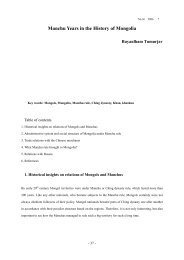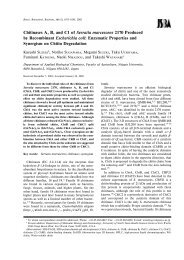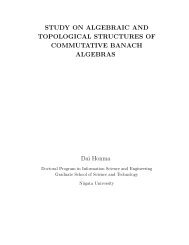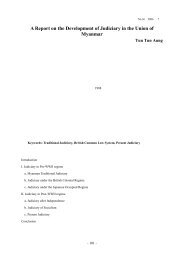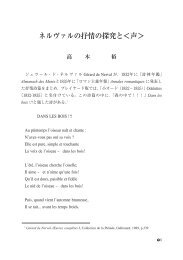An Overview of the Albanian History:
An Overview of the Albanian History:
An Overview of the Albanian History:
Create successful ePaper yourself
Turn your PDF publications into a flip-book with our unique Google optimized e-Paper software.
No.34 2005 12 <br />
government annulled outstanding agricultural debts, granted peasants access to inexpensive water for<br />
irrigation 43 , and nationalized forest and pastureland. Under <strong>the</strong> Agrarian Reform Law, which redistributed<br />
about half <strong>of</strong> Albania's arable land, <strong>the</strong> government confiscated property belonging to absentee landlords and<br />
people not dependent on agriculture for a living. The few peasants with agricultural machinery were<br />
permitted to keep up to forty hectares <strong>of</strong> land; <strong>the</strong> landholdings <strong>of</strong> religious institutions and peasants without<br />
agricultural machinery were limited to twenty hectares; and landless peasants and peasants with tiny<br />
landholdings were given up to five hectares, although <strong>the</strong>y had to pay nominal compensation. Thus tiny<br />
farmsteads replaced large private estates across Albania.<br />
<br />
2. <strong>Albanian</strong>-Yugoslav Tensions<br />
Until Yugoslavia's expulsion from <strong>the</strong> Cominform 44<br />
in 1948, Albania acted like a Yugoslav satellite and<br />
Tito aimed to use his chokehold on <strong>the</strong> <strong>Albanian</strong> party to incorporate <strong>the</strong> entire country into Yugoslavia. After<br />
Germany's withdrawal from Kosovo in late 1944, Yugoslavia's communist partisans took possession <strong>of</strong> <strong>the</strong><br />
province and committed retaliatory massacres against <strong>Albanian</strong>s. Before World War II, <strong>the</strong> Communist Party<br />
<strong>of</strong> Yugoslavia had supported transferring Kosovo to Albania, but Yugoslavia's postwar communist regime<br />
insisted on preserving <strong>the</strong> country's prewar borders. In repudiating <strong>the</strong> 1943 Mukaj agreement 45<br />
under<br />
pressure from <strong>the</strong> Yugoslavs, Albania’s communists had consented to restore Kosovo to Yugoslavia after <strong>the</strong><br />
war. In January 1945, <strong>the</strong> two governments signed a treaty reincorporating Kosovo into Yugoslavia as an<br />
autonomous province. Shortly <strong>the</strong>reafter, Yugoslavia became <strong>the</strong> first country to recognize Albania's<br />
provisional government.<br />
In July 1946, Yugoslavia and Albania signed a treaty <strong>of</strong> friendship and cooperation that was quickly followed<br />
by a series <strong>of</strong> technical and economic agreements laying <strong>the</strong> groundwork for integrating <strong>the</strong> <strong>Albanian</strong> and<br />
Yugoslav economies. The pacts provided for coordinating <strong>the</strong> economic plans <strong>of</strong> both states, standardizing<br />
<strong>the</strong>ir monetary systems, and creating a common pricing system and a customs union. So close was <strong>the</strong><br />
Yugoslav-<strong>Albanian</strong> relationship that Serbo-Croatian became a required subject in <strong>Albanian</strong> high schools.<br />
Yugoslavia signed a similar friendship treaty with Bulgaria, and Marshal Tito and Bulgaria's Georgi<br />
Dimitrov 46<br />
talked <strong>of</strong> plans to establish a Balkan federation to include Albania, Yugoslavia, and Bulgaria.<br />
Yugoslav advisers poured into Albania's government <strong>of</strong>fices and its army headquarters. Tirana was desperate<br />
for outside aid, and about 20,000 tons <strong>of</strong> Yugoslav grain helped stave <strong>of</strong>f famine. Albania also received<br />
- 253 -



